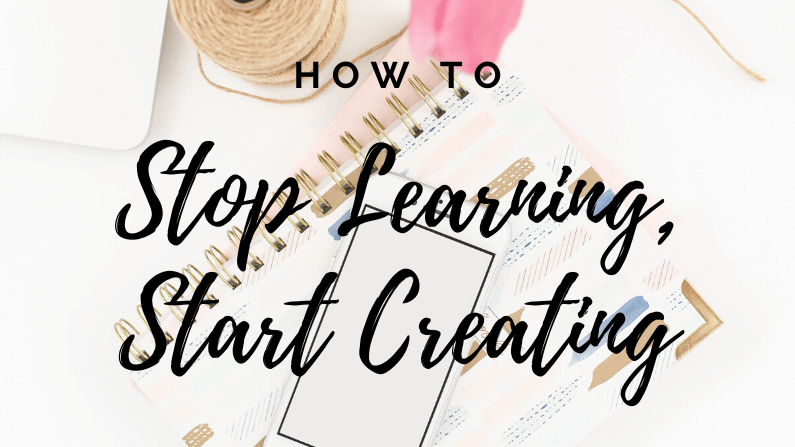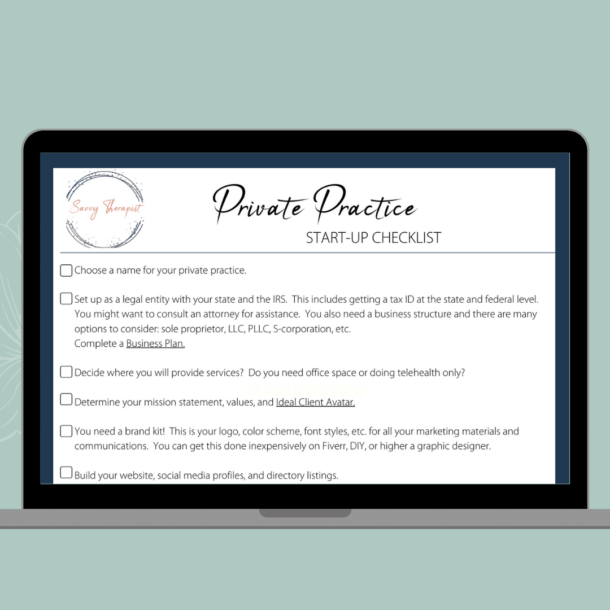You might find yourself a serial learner, if you never quite feel ready to create that first product/service. Tomorrow is the day you’ll start that big project! If you take one more course you’ll be ready right? Well, likely all this learning is actually just holding you back. Today, we are going to talk about how to stop talking all those courses and start creating your first product/service. Let’s start with some of the common reasons you are stuck in learning mode.
Why it’s Easy to Keep Learning Instead of Creating
Have you wondered why it is easy to justify continued learning and putting off creating your own product or service that actually makes you money? The answers boil down to human psychology and our basic desire to avoid failure and achieve success. Here are a few common hang-ups that keep creators stuck.
Fear of Failure
When you stick to learning and don’t actually create anything you can’t fail. That means zero risk. If you don’t take risks, there aren’t many rewards. Though you may feel comfortable playing it safe, it is really just a waste of time! Can you be an entrepreneur without a business? Without a product or service, you aren’t making money and thus your business will fail. It likely isn’t the outcome you’re looking for so read on.
Impostor Syndrome has a Hold on You
It is also easier to keep learning when you feel like an impostor. You justify continued learning because you tell yourself that next course will be exactly what you need to succeed. Impostor syndrome can be crippling and is a recipe for failure if you don’t recognize the hold it has and create a plan to overcome it.
If you are stuck in impostor syndrome you might be thinking thoughts like:
- Why would anyone buy my product, there is so much competition?!
- I’ll never be as good as (fill in the blank), they have a huge marketing budget, and everyone trusts them.
- What if no one buys my product?
- What if my customers think my service is terrible?
The list of discouraging thoughts experienced when deep in impostor syndrome can seem endless and pretty discouraging. There is no way out of impostor syndrome without working on your mindset and believing in yourself enough to take a risk! Start by crushing negative thoughts. Each time you feel impostor syndrome seeping into your mind, focus on one positive thought and one action you can take to prove your inner critic wrong.
Instead of focusing on how big your competition seems, remind yourself that they started out small just like you. Then decide on a bold action you can take to foster positive momentum towards your business goals. Spend time networking or validating your idea for a product/service. Focus on a small and quick win because they generate a lot of positive energy.
Lack of Clarity
Clarity might not be the most obvious reason you are stuck in an endless cycle of serial learning, but it is often a primary contributor. Have you ever had the following thoughts:
- I just don’t know if entrepreneurship is for me.
- I have no idea what product/service to create. I like a bunch of things, but I am not an expert in any of those things!
- I’ve got big dreams of what my booming business will look like, but no idea how I will get there.
- Where do I start? I have no clue what to offer.
It is so easy to get tangled up in what ifs. Continuing to worry about how everything will turn out in the end, keeps you from taking any steps towards that future in the present. Try not to focus on the end result. Instead, focus on the steps needed to get there.
Having a road map is important, but by itself will not help you achieve your entrepreneurial dreams. Being able to discern the one thing you need to do next to build your business and seeing that through is what actually leads to success. Success is built over time. Even though success can look easy and instant, the struggle taken to get that far is often overlooked.
How to Start Creating and Stop Being Stuck
So you’ve decided to stop taking courses and start creating! To free yourself from a cycle of learning without action there are a few simple actions you can take. Focus on stepping forward rather than standing in place.
Passion is Important
Don’t try to pursue something you don’t love just because you think it will make money. If you are passionate about what you are doing it feels less like work, you are happy to share it with others, and you are more likely to stick to it. This is especially true if you are starting a side business and still working full-time. It is hard to force yourself to spend your “time off” on something you don’t really like, right?
It is okay to pivot your business or reinvent yourself if the business you’ve built is no longer in aliment with your passions.
You Don’t Need to Be an Expert
I know this sounds like crappy advice, but it is true. You don’t need to be an expert to create a great product or service that helps others. Remember that you only need to be one step ahead of someone to help them out. In most cases, you build a product or service to help someone achieve a desire or solve a problem. As long as you can sufficiently solve the problem, being an expert doesn’t really matter all that much.
Being able to solve the customer’s problem with your product or service actually builds upon your credibility. Overtime, you become the expert you always wanted to be! Entrepreneurs learn and grow on the job. All the learning achieved through your trial/error and participation in ongoing learning leads to expertise in your niche.
Structure Your Learning Time
Likely, you still want to make good use of those courses and programs you’ve purchased. Ongoing learning is important, it just shouldn’t be priority. You need to focus on what makes money in your business. I recommend setting aside an amount of time each week just for learning a new tip, trick, or marketing technique.
After you’ve learned about the skill/technique, you must implement it before your next study session. If you simply move on to more learning, its unlikely that any of the studying done previously will produce any positive benefits in your everyday work as an entrepreneur.
For example, would you pay an employee to learn a new skill and then not use it on the job? I don’t think so! It’s also unlikely that you’d want to pay an employee to purse a personal interest that does not produce any benefit to your bottom line. If you are serial learning and not implementing, you are wasting your company’s best resource, you.
You Might Also Like…
Financial Moves to Make in Your Blogging Business When Money is Tight
Six Tips For Staying Productive and Positive During Social Distancing



Recent Comments